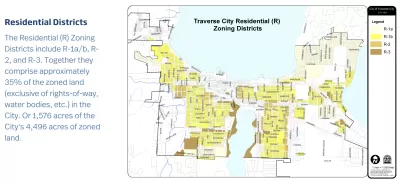Zoning changes for everything from housing density to minimum lot sizes are under consideration for a city on the shores of Lake Michigan.

Traverse City, Michigan is considering a package of zoning changes that would increase housing density and diversity by removing the existing cap on the number of allowable accessory dwelling units, among other changes.
“ADUs are currently capped at 15 annually, a number City Planning Director Shawn Winter has called ‘completely arbitrary,’” according to an article by Beth Milligan. “Another change would lift an owner occupancy requirement on ADUs, which stipulates that the property owner must live full-time in either the main house or the ADU.”
ADUs aren’t the only subject of the changes, however. The changes also “include allowing ADUs with a duplex, reducing the minimum land area for cluster housing, and allowing duplexes by right in the R-1a/b residential districts – which make up nearly 83 percent of all residential land in the city,” reports Milligan. “Triplexes and quadplexes would be allowed by right in the R-2 district, with ADUs allowed with duplexes and triplexes in R-2. The proposal also reduces the minimum lot width and area in the R-1a/b districts and allows two homes to be built on a lot that is twice the minimum area without being split.”
Opponents, organized under the moniker of the Alliance of Citizens for Traverse City have launched a website that describes the series of reforms as “blanket changes” and criticizing the market-based approach to housing. “Other cities that implemented these blanket zoning changes experienced skyrocketing property values (and taxes), gentrification, and loss of green spaces,” reads the website without mentioning specifics.
Research on the effects of ADU legalization and reduced minimum lot sizes was published by the Office of Policy Development and Research’s Cityscape journal.
The city’s planning commission approved the changes earlier this year. A public hearing conducted by the city commission earlier this week attracted a crowd ahead of an October 16 deadline for a date.
FULL STORY: Housing Zoning Changes Go Before City Commission

Maui's Vacation Rental Debate Turns Ugly
Verbal attacks, misinformation campaigns and fistfights plague a high-stakes debate to convert thousands of vacation rentals into long-term housing.

Planetizen Federal Action Tracker
A weekly monitor of how Trump’s orders and actions are impacting planners and planning in America.

Chicago’s Ghost Rails
Just beneath the surface of the modern city lie the remnants of its expansive early 20th-century streetcar system.

Bend, Oregon Zoning Reforms Prioritize Small-Scale Housing
The city altered its zoning code to allow multi-family housing and eliminated parking mandates citywide.

Amtrak Cutting Jobs, Funding to High-Speed Rail
The agency plans to cut 10 percent of its workforce and has confirmed it will not fund new high-speed rail projects.

LA Denies Basic Services to Unhoused Residents
The city has repeatedly failed to respond to requests for trash pickup at encampment sites, and eliminated a program that provided mobile showers and toilets.
Urban Design for Planners 1: Software Tools
This six-course series explores essential urban design concepts using open source software and equips planners with the tools they need to participate fully in the urban design process.
Planning for Universal Design
Learn the tools for implementing Universal Design in planning regulations.
planning NEXT
Appalachian Highlands Housing Partners
Mpact (founded as Rail~Volution)
City of Camden Redevelopment Agency
City of Astoria
City of Portland
City of Laramie





























